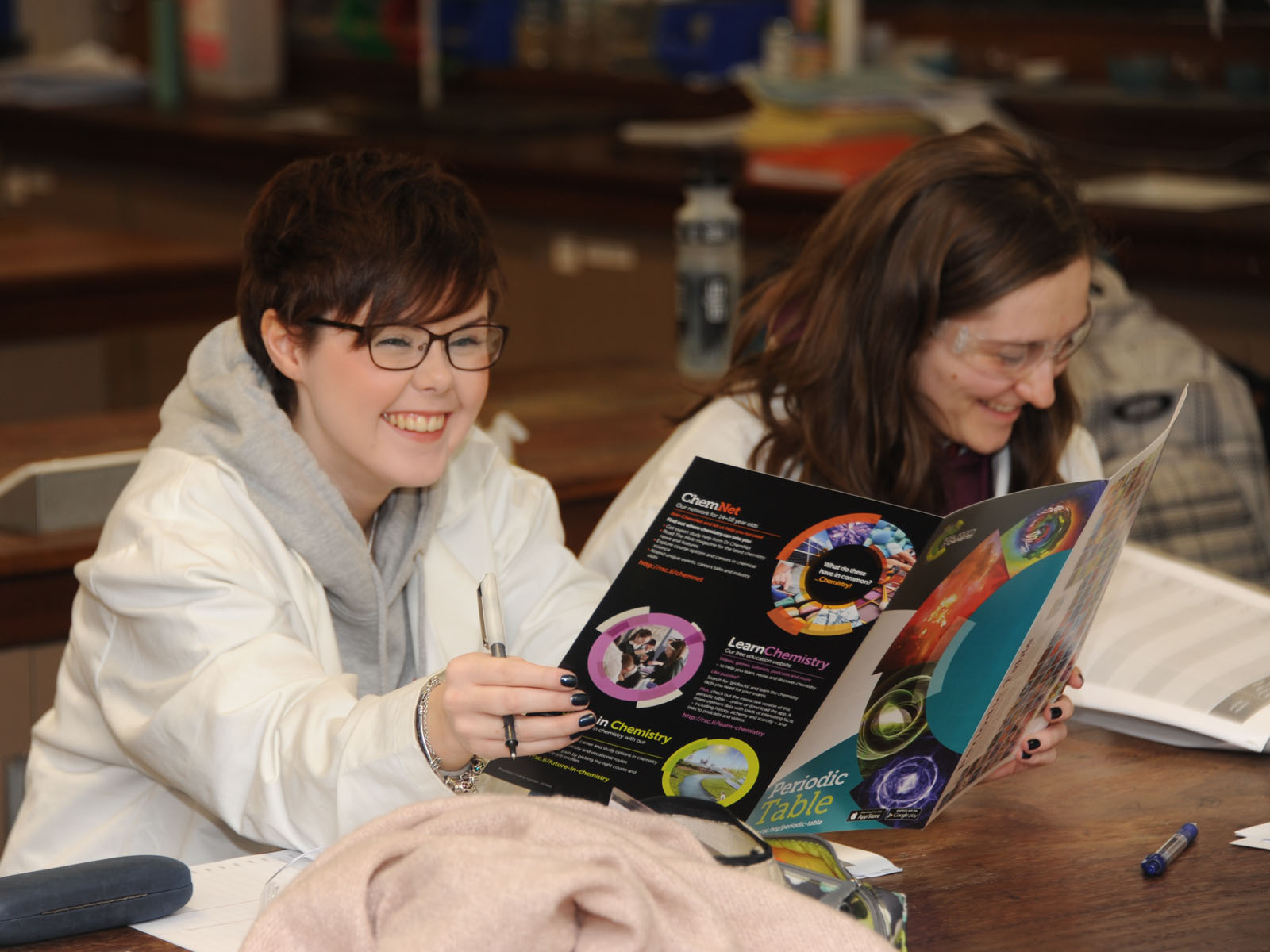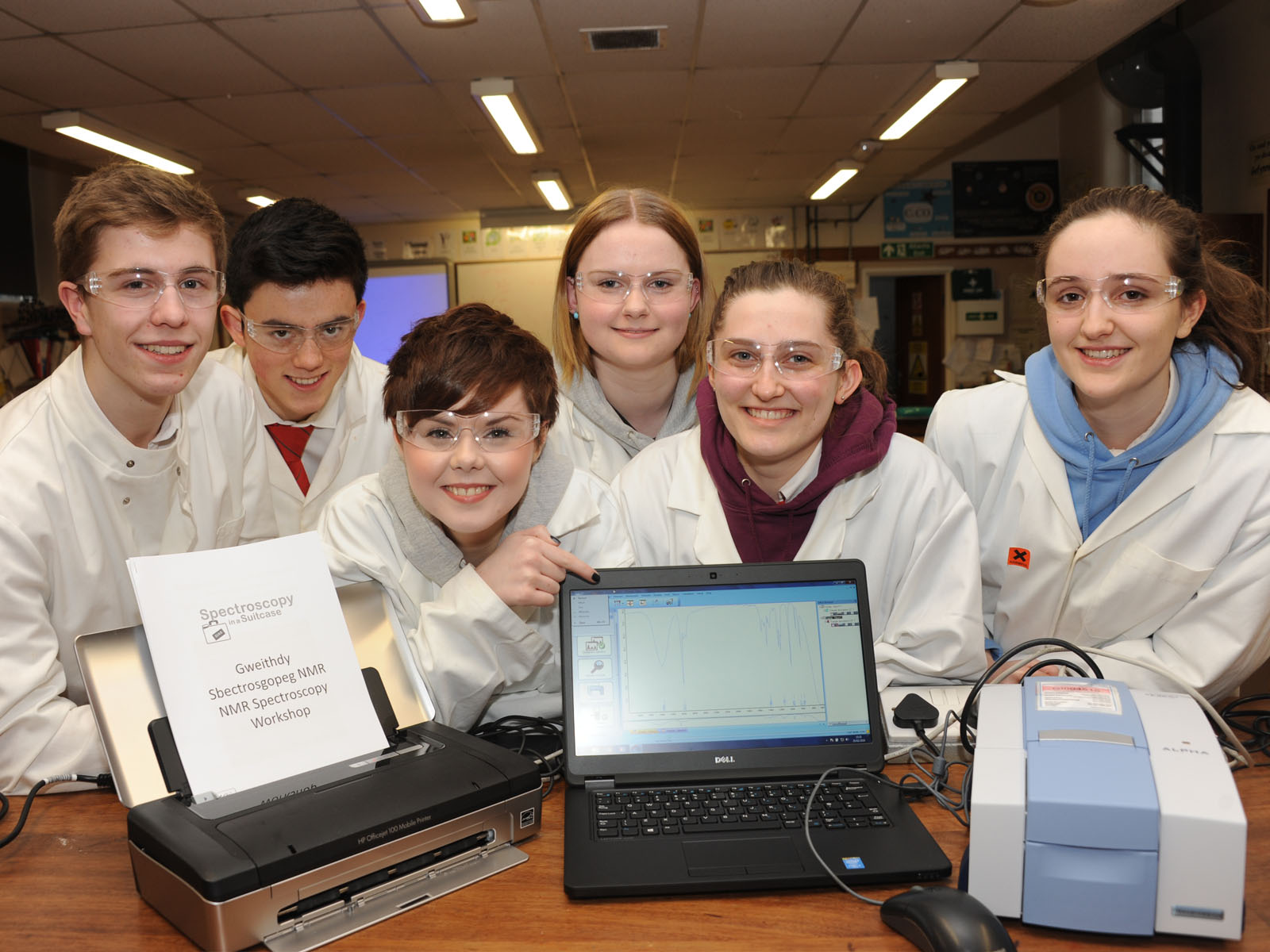Spectroscopy in a Suitcase expands in Wales

Picture: © Bangor University
Support from the Welsh government has enabled our flagship education outreach initiative to flourish over the last four years
Spectroscopy in a Suitcase (SIAS) is an outreach initiative that brings portable infrared (IR), UV-visible or Nuclear Magnetic Resonance (NMR) spectrometers into the classroom, enabling school pupils to gain first-hand experience with equipment usually unavailable to most schools.
While spectroscopy features on the chemistry curriculum for all 16–18 year old pupils across the UK and Ireland, it is a topic that students report finding hard to grasp without any context.
"It is important for students to get hands-on experience of these techniques if they are going to fully understand them", explains Mike Beer, a chemistry teacher at St David’s Catholic Sixth Form College.
"Students invariably comment that their understanding of spectroscopy improves after the workshops."
Government support
In 2012, the Welsh Government’s National Science Academy (NSA) agreed to support the expansion of the SIAS programme in Wales. Since then the project has grown rapidly, now reaching more school pupils than ever before.
"Thanks to the NSA we are now able to work with 80% of Welsh schools offering post-16 chemistry courses", says Katy Glazer, UK and Ireland co-ordinator for SIAS. "We have also been able to reach geographically further across Wales, with new hosts in more rural locations."
At the time of the initial agreement with the NSA, the SIAS programme had two Welsh hosts, in Cardiff and Bangor universities. Today, additional hosts in Aberystwyth, Swansea and Wrexham enable the programme to bring workshops to schools in all corners of the country. In the previous academic year over 3,400 school pupils in Wales participated in SIAS workshops, almost double the number reached back in 2012.
Techniquest Glyndŵr, a science centre in Wrexham, is the latest SIAS host to join the programme and the team often deliver their school visits with the assistance of lecturers from Wrexham Glyndŵr University. One of their first outings was to Hawarden High School in Flintshire.
Scott Fordwhalley, Curriculum Manager for Science at the school, was impressed with the way in which the workshop demonstrated practical applications of analytical chemistry: "The SIAS workshop was delivered in our school to a sixth form class and had a real impact with the students involved.
"They gained a real sense of the crossover of theory into ‘real life’ science applications, and they really enjoyed seeing how chemicals could be identified in this way."
The initial funding from the NSA also enabled the development of the NMR workshop and the purchase of two portable NMR spectrometers.
Enlli Haf Harper, a lecturer at Bangor University who has been involved with SIAS since 2011, helped to create the original pilot of the NMR course. "I was really excited when I first learnt that we were going to have an NMR spectrometer. It has definitely been a huge success", she says.
"Some teachers find it a difficult subject to teach and find the workshops to be a big help. It benefits all of the students as they can physically run their own samples."
"Students invariably comment that their understanding of spectroscopy improves after the workshops."
The interactive workshops are delivered by SIAS Ambassadors – staff and students from 36 ‘host’ universities and science centres across the UK and Ireland – who are provided with portable spectrometers that they can take to schools in their local areas.
Expanding around the UK
Following the success of the NMR workshops that were developed in Wales, they are now delivered across the UK by 10 different hosts. Support from the NSA also enabled a third Welsh host to be equipped with a portable NMR spectrometer.
Russell Williams, project manager at the NSA, explains that SIAS "represents a strategic Welsh Government pan-Wales investment".
He adds that the project "consolidates an effective relationship between the NSA and the RSC based upon supporting teachers through outreach activities and enabling wider engagement with school students by providing access to relevant ‘hands-on’ analytical equipment and techniques."
SIAS visits are often the first time that school pupils have come into contact with professional scientists. The workshops provide an opportunity to talk about real world research and applications of chemistry and, according to Enlli Haf Harper, are a valuable chance to encourage school pupils to consider studying STEM subjects at university.
She says: "We have had students come to study chemistry at Bangor University and do work experience here, who we first met when doing SIAS visits.”
While the SIAS programme offers clear benefits to participating school teachers and pupils, it is also a valuable experience for the undergraduate and postgraduate students who help to deliver the classes.

Picture: © Bangor University
Mark Driver, a PhD student based at Cardiff University, who has been a SIAS Ambassador for three years says: "SIAS has contributed massively to my skill set and has given me opportunities which I otherwise wouldn’t have been able to experience".
Mark states that his communication, team-working and organisational capabilities have all been improved through his involvement with the programme. "I’ve found that the skills I’ve developed in SIAS have also aided me in my research as the transferable skills are valuable across a wide range of activities", he adds.
Having helped to deliver around 50 workshops, Mark also explains that, aside from developing new competencies, involvement in SIAS is simply an enormously rewarding experience. For Mark, the most memorable visits are ones in which the workshops are run as a first introduction to spectroscopy.
"In these cases, students have typically never encountered at least one of the techniques we show them. Understandably, the students can struggle initially, but usually by the end of the sessions they are able to solve the spectra fairly confidently,” he says.
"The hardest of our samples are significantly more complex than the students are expected to solve in exams, so being able to take them from complete novice to solving the difficult spectra is great for the ambassadors to experience."
Further information
SIAS wouldn’t be possible with the support of our partners across the UK and Ireland. For information on booking a free SIAS workshop, read more on our SIAS webpages. Read more on our partnerships here.